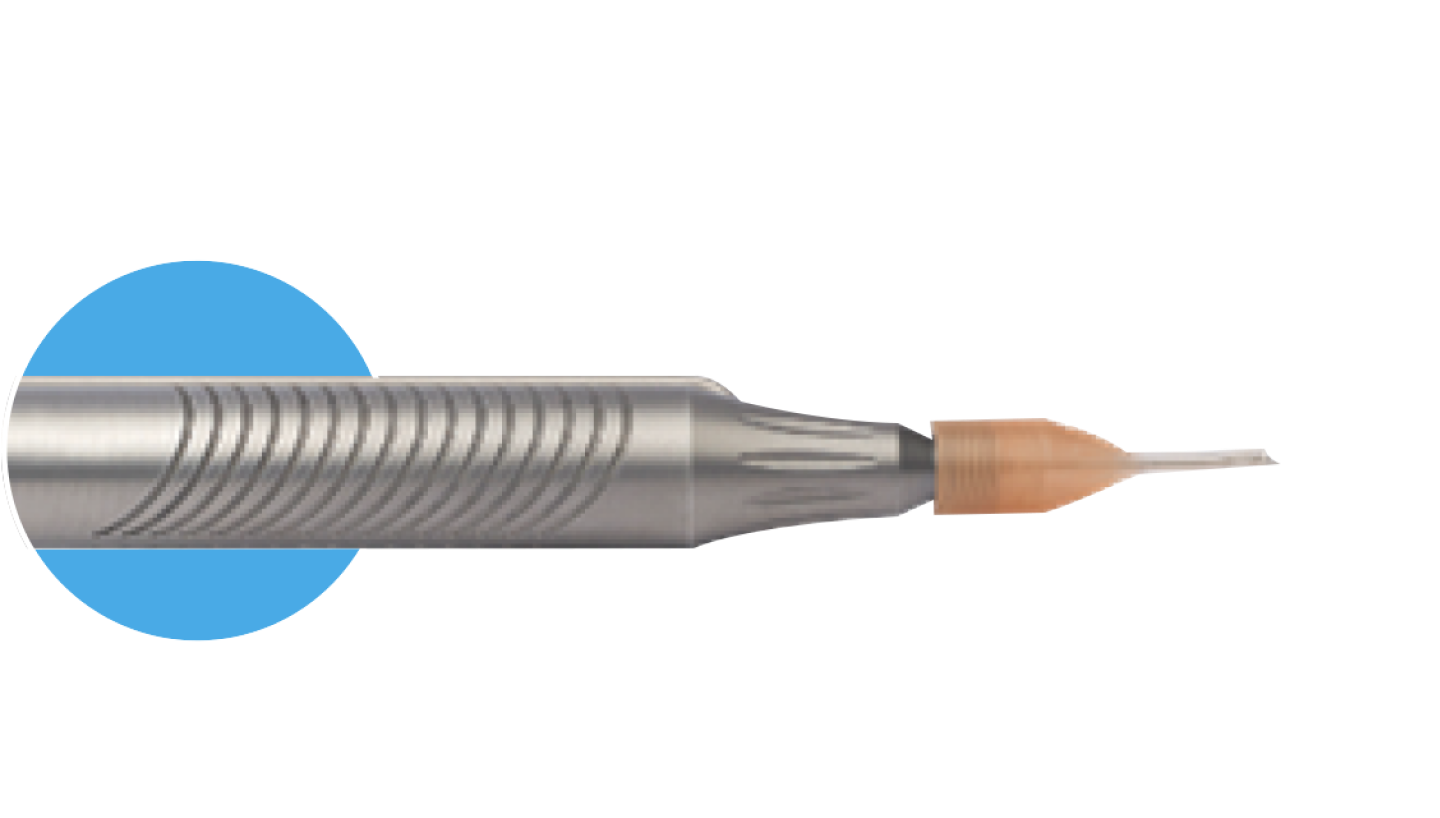INTREPID® Phaco Tips and
INTREPID® Transformer I/A Handpiece
![]()
Take Another Step Toward Safety and Confidence
INTREPID® Hybrid Tip
INTREPID® Hybrid Tip is designed to enhance safety and confidence vs Kelman® Tip.1-4
- Two trusted technologies in one innovative design
- Based on fluidics performance advantage of the INTREPID® BALANCED Tip1,2

Centurion® Vision System with ACTIVE SENTRY® Handpiece
Explore how to bring safety and confidence to the next level

Designed to reduce PCR likelihood by almost 70%8



INTREPID® BALANCED Tip
The combination of INTREPID® BALANCED Tip and OZil® Torisonal allows superior nuclear removal compared to Kelman® tip, thanks to increased torsional amplitude at the distal end.2,9,11
Optimised OZil® Torsional with the INTREPID® BALANCED Tip redefines nuclear removal.
The INTREPID® BALANCED Tip provides better fluidics performance compared to Kelman® tip, resulting in2,9,11:
- Reduced cumulative dissipated energy (CDE)
- Lower phaco time
- Lower total aspiration time
- Lower fluid use

See the Data








P value * = statistically significant
INTREPID® BALANCED Tip reduces tip movement at the incision11
The INTREPID® BALANCED Tip reduces tip movement at the incision, lowering thermal risk during surgery, which can result in less tissue damage at the incision site.9,11

Centurion® Vision System with ACTIVE SENTRY® Handpiece
Explore how to benefit from enhanced cutting efficiency and wound integrity with OZil® Torsional & INTREPID® BALANCED Tip

CENTURION® Silver System
Explore how to benefit from enhanced cutting efficiency and wound integrity with OZil® Torsional & INTREPID® BALANCED Tip

INTREPID® BALANCED
Tip Overview
Comparison with Kelman® Tip
INTREPID® BALANCED Tip Redefines Cutting Efficiency


INTREPID® Transformer I/A Handpiece
Transform I/A Performance to Enhance Safety and Confidence6,7,12,13
The Transformer I/A Handpiece is specifically engineered for an easy transition from either coaxial or bimanual cortical removal without the need to change handpieces, allowing for adaptability in a variety of cases.12
- Enables versatile I/A technique
- Features capsular-friendly polymer tips for reducing risk of PCR and capsule related problems
Coaxial Performance

- Enhanced irrigation flow13
- Accessibility to cortical material in almost all directions
Bimanual Performance

- Greater access to the subincisional cortex
- Extractable aspiration port features polymer-tip
CENTURION® Vision System with ACTIVE SENTRY® Handpiece
The leading technology in phacoemulsification, offering a new baseline of safety, consistency and efficiency at every stage of the cataract procedure.2,10,14-19

CENTURION® Silver System
The most advanced gravity system from Alcon, with enhanced stability and efficiency during phacoemulsification compared to INFINITI®.6,7,16,17,20-23

Alcon Experience Academy
For relevant training content from industry thought leaders
References
1. CENTURION® FMS Pack Directions for Use.
2. Khokhar S, Aron N, Sen S, Pillay G, Agarwal E. Effect of balanced phacoemulsification tip on the outcomes of torsional phacoemulsification using an active-fluidics system. J Cataract Refract Surg. 2017;43(1):22-28.
3. Solomon et al. Clinical study using a new phacoemulsification system with surgical intraocular pressure control. J Cataract Refract Surg. 2016; 42:542–549.
4. Zacharias J. Comparative motion profile characterization of the miniflared and balanced phacoemulsification tips. ESCRS Annual Congress; 2015; Barcelona.
5. Alcon Data on File, REF-07136, 2019.
6. Narendran N, et al. The Cataract National Dataset electronic multicentre audit of 55 567 operations: Risk stratification for posterior capsule rupture and vitreous loss. Eye. 2009;23:31–37.
7. Salowi MA, et al. The Malaysian Cataract Surgery Registry: Risk indicators for posterior capsular rupture. Br J Ophthalmol. 2017;101:1466–1470.
8. Shumway C. Utility of a novel hybrid phacoemulsification tip to prevent posterior capsule rupture. Presentation at ASCRS 2019; 3-7 May; San Diego.
9. Zacharias J. Thermal characterization of phacoemulsification probes operated in axial and torsional modes. J Cataract Refract Surg. 2015;41(1):208-216.
10. Zacharias J. Laboratory assessment of thermal characteristics of three phacoemulsification tip designs operated using torsional ultrasound. Clin Ophthalmol. 2016:10;1095–1101.
11. Noguchi S, et al. Difference in torsional phacoemulsification oscillation between a balanced tip and a mini tip using an ultra-high-speed video camera. J Cataract Refract Surg. 2016;42:1511–1517.
12. Intrepid® Transformer I/A Handpiece Directions for use.
13. Alcon Data on File, REF-04313, 2013.
14. CENTURION® Vision System Operator's Manual.
15. Alcon Data on File, REF-02559, 2017.
16. Thorne A, Dyk DW, Fanney D, Miller KM. Phacoemulsifier occlusion break surge volume reduction. J Cataract Refract Surg. 2018 Dec;44(12):1491-1496.
17. Aravena C, Dyk DW, Thorne A, Fanney D, Miller KM. Aqueous volume loss associated with occlusion break surge in phacoemulsifiers from 4 different manufacturers. J Cataract Refract Surg. 2018 Jul;44(7):884-888.
18. Malik PK, Dewan T, Patidar AK, Sain E. Effect of IOP based infusion system with and without balanced phacotip on cumulative dissipated energy and estimated fluid usage in comparison to gravity fed infusion in torsional phacoemulsification. Eye Vis (Lond). 2017;4:22.
19. Vasavada AR, et al. Comparison of torsional and microburst longitudinal phacoemulsification: A prospective, randomized, masked clinical trial. Ophthalmic Surg Lasers Imaging. 2010;41(1):109-114.
20. Nicoli CM, Dimalanta R, Miller KM. Experimental anterior chamber maintenance in active versus passive phacoemulsification fluidics systems. J Cataract Refract Surg. 2016;42(1):157:162.
21. Dyk DW, Miller KM. Mechanical model of human eye compliance for volumetric occlusion break surge measurements. J Cataract Refract Surg.2018 Feb;44(2):231-236.
22. Alcon Data on File, REF-08357, 2020.
23. Sharif-Kashani P, Fanney D, Injev V. Comparison of occlusion break responses and vacuum rise times of phacoemulsification systems. BMC Ophthalmol. 2014;14:96.
Please refer to relevant products DFU or Operator’s manuals for complete list of indications, contraindications and warnings.

